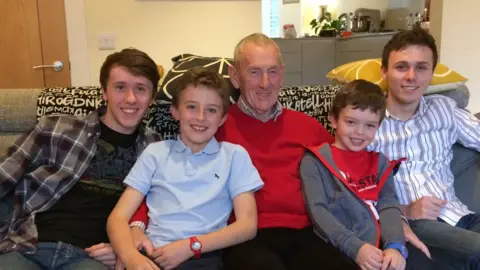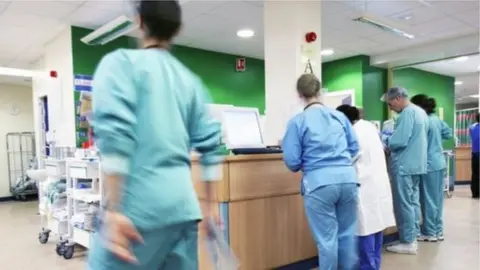Oesophageal cancer patients' 'naivety' warning
 Llyod Erskine
Llyod ErskineOnly 7.8% of oesophageal cancer patients in Northern Ireland are diagnosed in the earliest stages of the disease, a study has found.
The research was carried out by the Northern Ireland Cancer Registry.
About 7,800 people die from oesophageal cancer every year in the UK and for men it is the fourth most common cause of cancer death.
But early detection can be problematic as the symptoms can resemble minor conditions.
There has also been a steady rise in the number of oesophageal cancer cases in Northern Ireland.
Lloyd Erskine, from County Down, was diagnosed with the condition in July 2016 - six months after he first attended his GP with symptoms.
The 74-year-old said patients should demand to be screened and be more aware of the symptoms:
- Swallowing difficulties or a sensation of food sticking in your chest
- Pain or discomfort as food passes down the oesophagus
- Persistent (two-to-three weeks) heartburn/acid reflux
- Persistent cough or hoarseness
- Persistent hiccups
- Regurgitation of food on a regular basis
- Persistent nausea/retching/heaving
- Unexpected weight loss/unusual tiredness
Mr Erskine said in hindsight he had been "naive" about feeling unwell.
After months of finding it hard to swallow, Mr Erskine began eating only soft food.
"All along I thought it was heartburn, I battled on until one night the family insisted I ring the GP," he told the BBC.
A trip to the emergency department followed, but it took six weeks for further tests to reveal he had oesophageal cancer.

The tumour was already almost 6cm (2.3in) long.
"We just have to talk about...all the different types of cancer, be aware of symptoms and men especially shouldn't be put off going to see the doctor," he said.
Following chemotherapy last December, surgeons removed part of Mr Erskine's oesophagus.
While he missed Christmas dinner with his family, he had arranged an early Christmas a few days before he was admitted to hospital.
"Those are times when family mean the most, I had a lovely Christmas dinner knowing that in a few days my eating would be curtailed," he said.
A check-up this week revealed the cancer had not returned.
Andrew Kennedy, an upper gastrointestinal consultant with the Belfast Health and Social Care Trust, said GPs should not shy away from referring patients to hospital.
"Knowing the symptoms associated with this cancer is critical," he said.
"While the symptoms can often be non-specific and associated with less critical illnesses, if the GP or the patient is at all worried, send them to the hospital for screening."
Helen Setterfield is chair of the Oesphageal Cancer Support Group, she said patients can sometimes feel isolated when they return home to recover.
"As a former patient - we all share tips about eating, swallowing and learning to cope.
"It is just so valuable that we have walked in their shoes."
